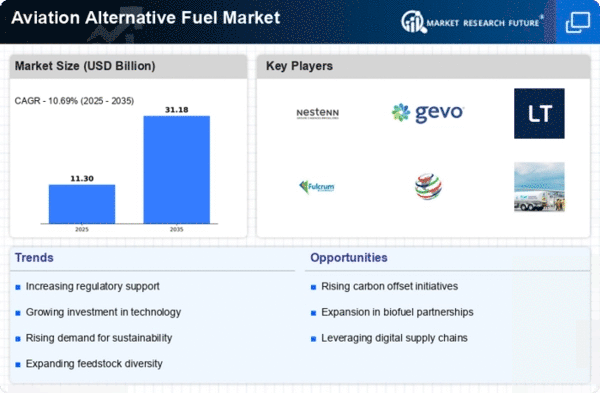Market Trends
Key Emerging Trends in the Aviation Alternative Fuel Market
The aviation alternative fuel market has witnessed significant trends in recent years, reflecting the aviation industry's commitment to sustainability and the need to reduce greenhouse gas emissions. As the aviation sector faces increasing pressure to address its environmental impact, alternative fuels have emerged as a key focus area. One significant trend shaping the market is the growing adoption of sustainable aviation fuels (SAFs). These fuels, derived from renewable sources such as biofuels, waste oils, and synthetic fuels, offer a promising solution to reduce the carbon footprint of aviation operations. Airlines and aircraft manufacturers are actively exploring SAFs as a means to achieve their sustainability goals and comply with regulatory initiatives aimed at curbing emissions from the aviation sector.
The push towards decarbonization in the aviation industry is driving investments and research into advanced alternative fuels. Sustainable aviation fuels, particularly those produced from feedstocks that do not compete with food crops, are gaining traction. Biojet fuels derived from algae, plant waste, and non-edible crops are being developed as environmentally friendly alternatives to traditional jet fuels. The goal is to create drop-in solutions that can be used in existing aircraft engines without requiring significant modifications, making the transition to alternative fuels more feasible for the aviation industry.
Collaborations and partnerships between airlines, fuel producers, and government bodies are playing a crucial role in shaping the aviation alternative fuel market. Stakeholders across the aviation value chain are joining forces to accelerate the development, production, and deployment of alternative fuels. These collaborations aim to create a supportive ecosystem that addresses the technical, economic, and regulatory challenges associated with the widespread adoption of aviation alternative fuels. Governments are providing incentives, policy support, and funding to encourage the aviation industry's transition to cleaner and more sustainable fuel options.
Technological advancements and innovation in fuel production processes are contributing to the growth of the aviation alternative fuel market. Advanced technologies, such as the Fischer-Tropsch process and hydroprocessing, are being employed to convert various feedstocks into high-quality aviation fuels. The focus is on improving the efficiency of production methods, enhancing fuel properties, and achieving cost competitiveness with traditional jet fuels. The development of synthetic fuels, produced through power-to-liquid processes using renewable energy, is also gaining attention as a viable alternative for reducing the carbon intensity of aviation.
Market trends indicate a growing interest in electrification and hybrid propulsion systems for aircraft, complementing the use of alternative fuels. Electric and hybrid-electric propulsion technologies are being explored as potential solutions for short-haul and regional flights. While these technologies are in the early stages of development and face challenges related to energy density and infrastructure, they represent a long-term vision for achieving zero-emission aviation. The integration of electric and hybrid technologies with alternative fuels aligns with the aviation industry's commitment to exploring diverse pathways to reduce its environmental impact.
The scalability and commercial availability of aviation alternative fuels are key challenges that the industry is actively addressing. Achieving economies of scale in the production of sustainable aviation fuels is essential to make them cost-competitive with traditional jet fuels. Investments in large-scale production facilities and advancements in feedstock availability and processing technologies are critical for overcoming these challenges. Additionally, establishing a robust supply chain and infrastructure for the distribution of alternative fuels at airports is essential for their widespread adoption.



















Leave a Comment